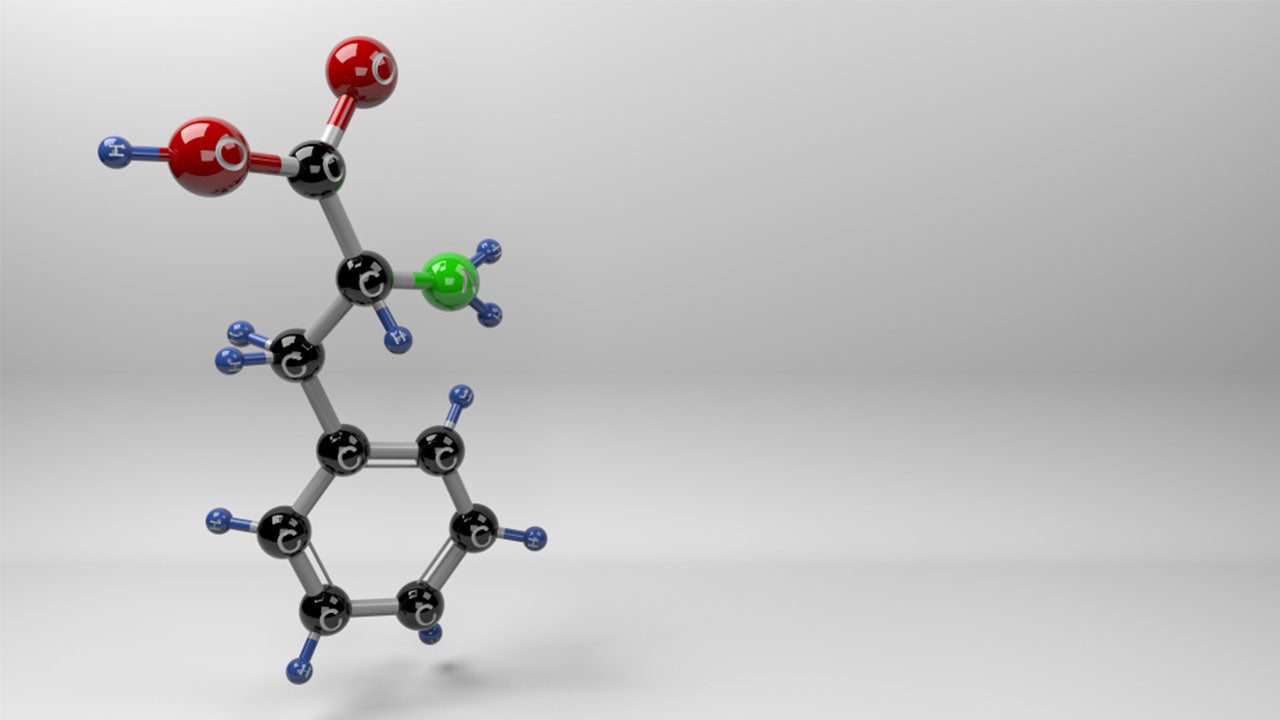Unlock Lasting Weight-Loss Results by Understanding Hunger Control
 By: by Dr Robert Wolfe
By: by Dr Robert Wolfe

Weight loss and successful long-term weight maintenance depend on a number of factors, one of which is controlling the desire to eat. While there are numerous approaches to weight management, reducing your caloric intake will almost certainly play an important role in helping you achieve your desired body weight. No matter how dedicated you are, if you're dealing with persistent feelings of hunger, it's highly likely that you will deviate from your mindful eating intentions. Fortunately, there are scientifically validated ways to keep your hunger levels in check. Researchers have found that dietary proteins, as well as amino acids, play key roles in hunger control.
Studies Show Eating More Protein Can Curb Hunger
Increasing satiety by choosing the right foods to eat is essential to achieving successful weight loss and weight maintenance.
Scientists have known for more than 50 years that when you eat a high-protein meal you end up consuming fewer calories. In 1956, a research team composed of Sherman Mellinkoff, Marjorie Frankland, David Boyle, and Margaret Greipel found a clear link between amino acid concentration in the blood and hunger levels. The more amino acids were circulating in a subject's blood, the lower their reported level of hunger...and the fewer amino acids, the higher their level of hunger. The researchers noted that the same relationship appeared to exist between blood sugar levels and hunger—when blood sugar levels dropped, participants' appetites soared. Since that pioneering study, it has been repeatedly shown that dietary protein elevates amino acid concentrations in the blood and that high-protein meals function as appetite suppressants.
Several studies conducted on healthy subjects have shown, too, that long-term adherence to a high-protein diet can increase feelings of fullness in an enduring way. Some of these studies carefully controlled energy balance by having the subjects live in a chamber for several days so that their total energy expenditure could be accurately measured. The level of energy expenditure was matched with the same amount of caloric intake. This approach ensured that the only variable was the level of protein intake, so there was no doubt that the effect on appetite control stemmed from the higher intake of dietary protein.
Why Eating High-Protein Meals Makes You Feel More Satiated
There are a few theories as to why a high-protein meal makes you feel fuller.
One potential pathway has to do with hunger hormones such as peptide YY (PYY), sometimes referred to as the fullness hormone. Research shows that peptide YY helps control hunger and food intake. Scientists have found that when you eat protein, your gut releases these hunger hormones.
According to a study published in Cell Metabolism, eating a high-protein diet increases your body's production of hunger-fighting PYY.
"We've now found that increasing the protein content of the diet augments the body's own PYY, helping to reduce hunger and aid weight loss," said Rachel Batterham of University College London, a Medical Research Council clinician scientist and the study's lead author.
Batterham and her fellow researchers found that eating high-protein meals stimulated the body to release more PYY than either high-fat or high-carbohydrate meals. Consequently, both normal-weight and obese participants who ate the high-protein meals reported fewer food cravings and less overall hunger.
The research team conducted follow-up studies with mice in order to eliminate other factors that could influence the results. They discovered that mice on high-protein diets had higher PYY levels and ate fewer calories than those who ate the usual amount of protein. They also had lower body fat levels.
So, what is it about high-protein foods specifically that produces this effect on fullness signals?
One hypothesis, which I introduced above, has to do with amino acids. Proteins are made up of amino acids, so when we eat a high-protein meal the plasma concentrations of their component amino acids spike. Some researchers, including the team behind that groundbreaking 1956 study, believe that this elevation of plasma amino acid levels can promote feelings of fullness.

Amino Acids: The Key to Quelling Many Types of Hunger
A review of studies conducted to date provides indisputable evidence that amino acids on their own, separate from other compounds found in protein, can lower hunger levels.
The satiating effect of increased plasma amino acids was proven in an experiment in which amino acids were infused intravenously. This study demonstrated that intravenous amino acid infusion increased the satiety rating and feeling of fullness, even though nothing was ingested into the gastrointestinal tract. The suppression of appetite was due to elevated plasma amino acid concentrations. When the infusion stopped and plasma amino acid concentrations returned to the basal level, the effect on satiety was eliminated.
As with the question of exactly what biological mechanisms underlie the clear connection between protein intake and increased satiety, there is no single, succinct answer to the question of why their component amino acids have such a pronounced effect on hunger control.
One possibility is that a greater availability of amino acids, particularly the essential amino acids that cannot be produced in the body, stimulates protein synthesis. The stimulation of protein synthesis increases energy expenditure. Recent research proposed that the extra use of oxygen associated with stimulated protein synthesis results in increased satiety.
Another possibility is that the actions of amino acids in the brain stimulate satiety. When amino acids were infused into the intestines of cats, either as a mixture or independently, researchers recorded increased signaling from the part of the brain responsible for satiety. Early amino acid studies that identified the brain receptor that influences satiety are supported by the more recent identification of a chemosensor for dietary essential amino acids in the brains of rats. This area of the brain projects signals to other brain areas that are associated with the control of food intake.
Do All Amino Acids Help Control Hunger?
The short answer is, no. While all amino acids have health benefits and can be valuable components of dietary supplements, scientists have found that only some amino acids increase satiety. Other amino acids have been shown to have either no discernible effect on appetite or, in some cases, to stimulate the appetite.
The results of one study showed that while tryptophan and lysine increased satiety, proline and threonine had no effect and arginine decreased satiety.
The results of another study in which essential amino acids were directly injected into the cerebroventricular area of the brain found that injections of all three of the branched-chain amino acids (BCAAs) or leucine individually led to a suppressed food intake. Ultimately, the study's authors determined that the effect of the BCAA injection was entirely due to leucine, as individual injections of the other BCAAs, isoleucine and valine, had no effect.
Not only does an augmented supply of certain dietary essential amino acids including leucine, lysine, and tryptophan induce satiety, but the reverse is also true. When your body lacks amino acids, that spurs your appetite.
Research consistently indicates that a low-protein diet drives increased food intake—in fact, there is a brain receptor that identifies a diet deficient in essential amino acids! A low-protein diet causes an increase in food intake in order to correct the amino acid deficiency, which can easily result in weight gain. This phenomenon was demonstrated by a study published in Physiology and Behavior. Increased food intake occurs when intake of all the essential amino acids drops, not just leucine or other amino acids directly linked to fullness signals.
How You Can Use Scientific Findings to Achieve Real-World Weight-Loss Results
So, you may be asking yourself, what does this all mean for my personal weight-loss journey?
As I have mentioned, understanding the precise biological mechanisms that affect hunger control can be challenging. Satiety is difficult to quantify objectively in humans. A number of factors come into play, and we do not have access to the complete workings of the brain. Consequently, we must rely extensively on data obtained from rats, which differ from humans in obvious ways. That being said, there are important findings obtained from studies on rats that are relevant to human nutrition.
With regard to amino acids, a rat’s brain can sense when essential amino acids are available and modify dietary intake accordingly. Elevated levels of certain essential amino acids—namely leucine, lysine, and tryptophan—can increase satiety, while a deficiency of essential amino acids increases the amount of food eaten. Following this science, a low-protein diet increases food intake and causes weight gain, and a high-protein diet reduces food intake.
In addition to ensuring an adequate intake of dietary protein, you may find it beneficial to consume a balanced mixture of free essential amino acids. Essential amino acids produce the same effect as high-protein foods but contain far fewer calories.
Taking a complete essential amino acid supplement with all the essential aminos has been shown to be the most low-calorie way to improve hunger control. While not all amino acids directly affect your hunger levels, it appears that supplementing with individual amino acids does not have the same effectiveness as optimizing your intake of all the essential amino acids. I recommend Life, a balanced essential amino acid supplement that can help control your hunger and promote the weight-loss results you crave.

Up to 25% off Amino
Shop NowTAGS: tips
Join the Community
Comments (0)
Most Craveable Recipes




 833-264-6620
833-264-6620



















